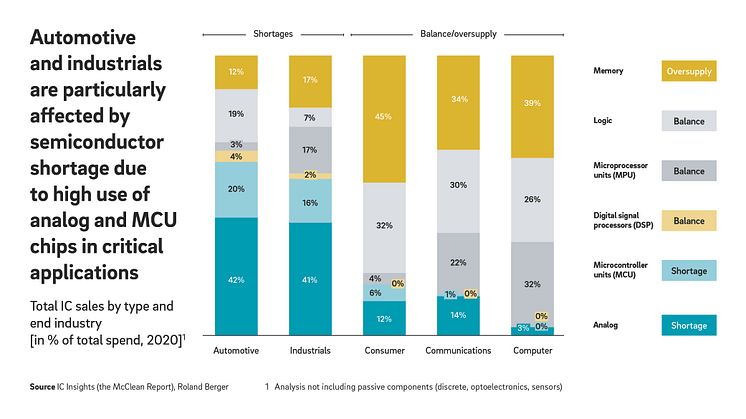
Press release -
Chip shortage in automotive and industrials despite lower demand for semiconductors
- Up to 30% lower demand in consumer electronics results in revenue decline for semiconductor manufacturers in 2022 and 2023
- Supply bottleneck for analog chips and microcontrollers set to last several years
- At the same time, advanced-node chips are subject to overcapacity and oversupply
Munich, November 2022: After the start of the pandemic, demand for microchips was sent skyrocketing by computer, TV and household appliance manufacturers. For the second half of 2022, however, the consumer electronics sector is now reporting a massive decline in demand. This is leading to a drop in sales for some semiconductor manufacturers and an oversupply of the newer, high-performance chips. Older-generation semiconductors, on the other hand – those that are often still used in automotive and industrial electronics – are set to remain in short supply for the foreseeable future. These are some of the key findings of the study “Semiconductor shortage: A different kind of trouble ahead” by Roland Berger.
"We are still seeing a structural shortage of analog semiconductors and microcontrollers that will last several years. Lower demand for computers and consumer electronics does provide some relief for the semiconductor industry. But it will make capacity and inventory planning even more difficult for both, the manufacturers of microchips and the companies that use them," says Falk Meissner, Partner at Roland Berger. "We have the unusual situation of seeing shortages, overcapacities and oversupply of semiconductors all at the same time."
High inventories vs. chip shortages
There is currently an oversupply in the market for nearly half of the chips needed in consumer electronics, while in computers the oversupply amounts to almost 40% and in telecommunications 34%. On the other hand, there is a shortage of analog semiconductors and microcontroller units (MCU), and these account for almost two-thirds of the chips installed in the automotive sector and 57% of those used in the industrial sector.
Electronic manufacturing services for electronic components, such as smartphones and televisions, increased their inventory levels from the historical average of 16% (2012-2020) to 23% (2020-2021). This initially exacerbated the chip shortage for high-performance chips. Now, as global demand for these chips subsides, there is an increased risk of a bullwhip effect – where even small changes in end customer demand can lead to increasingly large fluctuations in order quantities along the multi-level supply chain. To avoid negative financial impacts or even scrapping stocks, these companies need to change the way they approach inventory management.
Government subsidies offer little short-term relief
The newly passed laws to promote domestic semiconductor production in the United States (US Chip Act) and Europe (European Chip Act) do little to change the situation. Lead times are very long and, furthermore, there is almost no support for the production of older chip generations. In the USA, for example, only USD 2 billion, or 5%, of the USD 39 billion in subsidies for semiconductor production is allocated to older-generation chip manufacturing.
Companies should rethink their chip management and grasp opportunities
Buyers of semiconductors must use the coming months to build capability in strategic chip management and significantly increase supply chain visibility. Automotive suppliers and contract manufacturers will particularly need to optimize their inventories as well as their cash and cost management.
"Automotive and industrial companies need to adapt to the market practices of the electronics and semiconductor industry in order to secure their chip supply. That will include always using the latest generation of chips and having a risk-adjusted procurement policy. Companies cannot just wait for the chip shortage to pass – they will need to be very proactive themselves," Meissner sums up.
Topics
Categories
Roland Berger is the only strategy consultancy of European origin with a strong international presence. As an independent firm owned exclusively by our partners, we have 51 offices with a presence in all major markets. Our 2,700 employees are characterized by a unique combination of analytical thinking and an empathetic mindset. Driven by our values of entrepreneurial spirit, excellence, and empathy, we are convinced that business and society need a new, sustainable paradigm that focuses on the whole value-creation cycle. By working in interdisciplinary teams across all relevant sectors and business functions, Roland Berger offers the best expertise worldwide for successfully overcoming the profound challenges of our age now and in the future.



